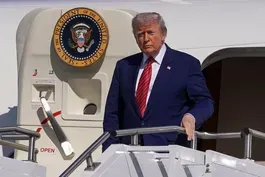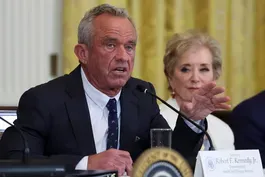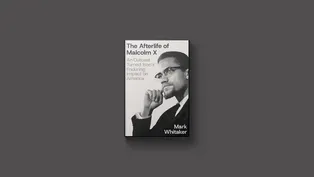
Calls grow for judges to control their security force
Clip: 5/27/2025 | 6m 45sVideo has Closed Captions
As Trump lashes out against courts, calls grow for judges to control their security force
Ensuring the safety of federal judges falls to the U.S. Marshals Service, an agency within the Justice Department. But as President Trump increasingly lashes out at the courts, empowering judges to oversee their own dedicated security force is an idea that is gaining traction. Geoff Bennett discussed more with Jeremy Fogel of the Berkeley Judicial Institute at the UC Berkeley School of Law.
Problems with Closed Captions? Closed Captioning Feedback
Problems with Closed Captions? Closed Captioning Feedback
Major corporate funding for the PBS News Hour is provided by BDO, BNSF, Consumer Cellular, American Cruise Lines, and Raymond James. Funding for the PBS NewsHour Weekend is provided by...

Calls grow for judges to control their security force
Clip: 5/27/2025 | 6m 45sVideo has Closed Captions
Ensuring the safety of federal judges falls to the U.S. Marshals Service, an agency within the Justice Department. But as President Trump increasingly lashes out at the courts, empowering judges to oversee their own dedicated security force is an idea that is gaining traction. Geoff Bennett discussed more with Jeremy Fogel of the Berkeley Judicial Institute at the UC Berkeley School of Law.
Problems with Closed Captions? Closed Captioning Feedback
How to Watch PBS News Hour
PBS News Hour is available to stream on pbs.org and the free PBS App, available on iPhone, Apple TV, Android TV, Android smartphones, Amazon Fire TV, Amazon Fire Tablet, Roku, Samsung Smart TV, and Vizio.
Providing Support for PBS.org
Learn Moreabout PBS online sponsorshipGEOFF BENNETT: Ensuring the safety of federal judges falls to the U.S.
Marshals Service, an agency within the Justice Department.
But, as President Trump increasingly lashes out at the courts, an idea is gaining traction, empowering judges to oversee their own dedicated security force.
Jeremy Fogel joins us now.
He's a former federal judge in California and now executive director of the Berkeley Judicial Institute at the U.C.
Berkeley School of Law.
Thanks for being here.
JEREMY FOGEL, Berkeley Judicial Institute Executive Director, Berkeley Law School: Thank you very much for having me.
GEOFF BENNETT: As we have reported on this program, threats against federal judges have surged in recent months, including bomb threats, swatting incidents.
What kind of strain does that place on the judiciary and on the judges themselves?
JEREMY FOGEL: It's an enormous strain.
We're very fortunate that there haven't been any recent actual attacks.
I mean, there have been a lot of threats, but they haven't actually been carried out.
There have been situations in the past where judges were attacked or their families were attacked, but nothing on the order of magnitude that we're talking about here, where there's literally dozens of threats against people.
The rhetoric that's used is unprecedented in my experience.
I was a judge for 37 years.
I don't recall ever hearing rhetoric like we're hearing now.
And so it's a very toxic atmosphere.
And I think it affects judges, even if you're not directly one of the people in the crosshairs.
You see it happening to your colleagues.
You see it happening to judges in other parts of the country.
I get around a lot.
I used to run the Federal Judicial Center here in D.C.
I know hundreds of judges.
And I'm happy about those relationships.
People are stressed out.
People are really feeling the pressure of the environment that we're in.
GEOFF BENNETT: You mentioned the toxic rhetoric.
President Trump has stepped up his criticism of judges, especially those who have ruled against his policies.
He's called them radical left.
He says they're absolutely out of control.
Just yesterday in a post, he called federal judges monsters who want our country to -- quote -- "go to hell."
What's the practical impact of that?
JEREMY FOGEL: Well, I think people on one hand look at it and say, well, that's not to be taken seriously.
And, on the other hand, it does create an environment where you say we have the president of the United States saying things like that.
It's unprecedented.
There are people who follow his leadership who are affected by the things that he says.
And I don't think judges -- certainly, sitting judges can't be in a position where they want to -- they can't really engage with that because they're not allowed to comment on cases.
They have to stay silent about that.
But it just creates an atmosphere where you can't talk about what really matters.
This rhetoric is really quite at odds with that.
GEOFF BENNETT: On the matter I mentioned in the introduction to this segment, Democrats in Congress, as you know, they introduced a bill last week to shift control of the U.S.
Marshals Service to the judiciary.
The idea is to prevent political interference, to ensure strong security.
Is that a good idea or a realistic one?
JEREMY FOGEL: Well, it's two different questions.
I mean, it's probably not realistic at the moment because I'm not sure there's the political consensus to make it happen, and Congress obviously is very divided.
Whether it's a good idea is a delicate question.
It certainly makes sense in the way that judges would be responsible for things that directly affect them.
I think it's an idea that should be seriously studied.
It's very delicate, though.
And I just want to emphasize that -- the relationship between the judiciary and Congress now.
I don't think the judiciary wants to do anything to upset such communication as exists.
And I have to say, I was -- when I was a federal judge, I had great confidence in the Marshals Service.
I still have great confidence in the Marshals Service.
Nothing has happened that would cause one to think that the Marshals Service on its own is going to abandon the judges that they provide security for.
I think it's the political environment.
It's the toxicity I was referring to before that makes people worry about it.
And I think people have to have serious and honest discussions about that.
GEOFF BENNETT: President Trump has removed security details from some of his political adversaries, his perceived political adversaries.
How real is the concern that he might do the same, either reduce or limit the security for judges who've ruled against him?
JEREMY FOGEL: Well, that concern exists.
And it exists for the reason you said, because he's done it with other people.
It hasn't happened yet.
There's been assurances given by people in the administration that they have no intention of doing it.
I am an optimist by nature, I don't think it's going to happen, but I'd hate to be wrong about that.
And when you have a very controversial case or a judge who does something that really gets crosswise with the administration, that is one of the thoughts that comes to mind for people, is, well, the next thing he will do is pull security or pull funding or something like that.
And this is what I mean about a toxic environment.
It's, we shouldn't be thinking and worrying about things like that.
We should be thinking and worrying about, did the judge get the law right, did the judge get the facts right, what does the evidence in the case show, did everybody have a chance to be heard?
These are the things that we ought to care about.
These are the things that are embedded in our Constitution.
And we're spending time kind of dealing with the emotional strain, the mental strain that comes from this kind of rhetoric that we're seeing.
GEOFF BENNETT: In the time that remains, I want to draw on your legal knowledge and ask you about the Trump administration freezing what is now more than $2.5 billion to Harvard University over that institution's refusal to agree to President Trump's wish list of reforms.
How will the courts view this?
Because the law is clear that only Congress has the power of the purse.
JEREMY FOGEL: Right.
Well, there's the Impoundment Act, which is an act of Congress that will have to be dealt with by the courts that hear this matter.
There's also a claim that what's happening is retaliation for exercise of First Amendment rights and other constitutional rights.
So there are some pretty robust claims that Harvard can make in the legal actions that it's taken.
I have no idea how those are going to turn out.
Remember, the first thing that's going to happen is, a district court's going to weigh in.
And the district court in Boston already has.
It's issued temporary relief to Harvard on certain aspects of this.
But it's going to work its way up through the appellate courts.
The Supreme Court's going to have the final word about it.
They in some recent rulings have indicated some openness to the idea of what is known in the legal world as unitary executive, this sort of increased powers of the president.
How that's going to cut in a situation like this is something I really don't know.
And we will see how the case gets litigated.
GEOFF BENNETT: Jeremy Fogel, thanks so much for your insights and for being here.
Appreciate it.
JEREMY FOGEL: Thanks so much.
Thanks for having me.
A look at Trump's controversial pardons for loyalists
Video has Closed Captions
Clip: 5/27/2025 | 7m 16s | A look at Trump's controversial pardons for political allies and loyalists (7m 16s)
News Wrap: CDC changes COVID shot recommendations
Video has Closed Captions
Clip: 5/27/2025 | 4m 56s | News Wrap: CDC no longer recommends COVID shots for healthy children and pregnant women (4m 56s)
NPR CEO on suing Trump over order targeting funding
Video has Closed Captions
Clip: 5/27/2025 | 7m 3s | NPR CEO discusses suing Trump administration over order targeting funding (7m 3s)
'The Afterlife of Malcolm X' examines his lasting impact
Video has Closed Captions
Clip: 5/27/2025 | 6m 47s | New book 'The Afterlife of Malcolm X' examines his lasting impact on civil rights (6m 47s)
University of the People offers affordable college education
Video has Closed Captions
Clip: 5/27/2025 | 8m 58s | University of the People offers students a new and affordable college experience (8m 58s)
U.S.-backed Gaza aid system quickly overwhelmed
Video has Closed Captions
Clip: 5/27/2025 | 10m 25s | New U.S.-backed aid distribution system in Gaza quickly overwhelmed (10m 25s)
Providing Support for PBS.org
Learn Moreabout PBS online sponsorshipSupport for PBS provided by:
Major corporate funding for the PBS News Hour is provided by BDO, BNSF, Consumer Cellular, American Cruise Lines, and Raymond James. Funding for the PBS NewsHour Weekend is provided by...

















